How Sensory Rooms Make a Difference in Dementia Care
Hebrew Rehabilitation Center’s new sensory rooms are positively impacting patients’ lives.
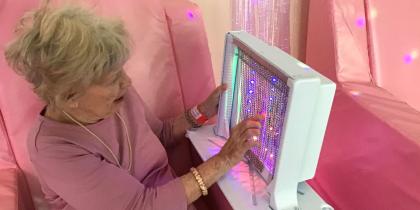
Imagine entering a room with soothing lights, calming sounds, and a variety of thoughtfully picked activities designed to stimulate your senses in a safe and supported space. That’s what patients at Hebrew Rehabilitation Center in Boston and Hebrew Rehabilitation Center at NewBridge at the Charles experience in our new sensory rooms on the memory care units.
The sensory rooms were generously funded by Hebrew SeniorLife donors. The room on the Boston campus was made possible with a gift from the Sephardic Foundation on Aging, and the Gerald Corrigan Multi-Sensory Suite on the NewBridge campus was funded with a gift from the Challenger Foundation.
What are sensory rooms?
A sensory room is a treatment tool that stimulates the six senses: sight, sound, smell, touch, taste, and movement. These stimulating opportunities provide people with cognitive decline with a safe and comfortable environment that empowers them to continue to make their own choices.
Cognitive impairment and dementia can redefine what meaningful activity looks like in someone’s life. The physical environment a person is part of plays a role in whether they participate in meaningful activities, and someone with cognitive decline is more likely to thrive if the environment around them is set up for them to do so. At Hebrew Rehabilitation Center, that’s what we strive to do.
Using an interdisciplinary team approach, our life enhancement, nursing, spiritual care, and social work teams have been trained to use this room. Our goal is to build clinical documentation specific to addressing the needs of patients who can benefit from the equipment in the room. This will help us reach our goals of having a positive impact on our patients and has the potential to lead to future research opportunities. The therapeutic goals of the room are evaluated by the staff member who facilitates the visit to meet the specific needs and interests of the patient.
A sensory room aims to provide entertainment and stimulation in an environment free from cognitive demands. Stimulating the senses is an effective way to engage with people with dementia who may have difficulty with verbal communication.
Older adults with Alzheimer’s disease and other forms of dementia encounter increasing loss and confusion as their disease progresses. This is when it can become most important to focus on their remaining strengths and create opportunities to enjoy life through the six senses. Providing more of these opportunities can help to minimize the pressure older adults feel while completing activities of daily living or the stress of processing information.
For example, someone who enjoyed crafting in their younger years may derive pleasure from the tactile wall panel that displays various colors and textures. The interactive motion projector could benefit someone who has enjoyed movement-based activities such as athletics. For some, these experiences can connect them to meaningful memories that go beyond mere enjoyment and can even support relaxation and decrease symptoms of anxiety.
Choosing equipment for our sensory rooms
We were mindful when choosing the equipment for our sensory rooms. We wanted to provide sensory stimulation and address the common needs of the population we serve.
For example, bubble tubes are calming, stimulating visual aids that can promote a multisensory experience, including visual sensation, movement, and touch.
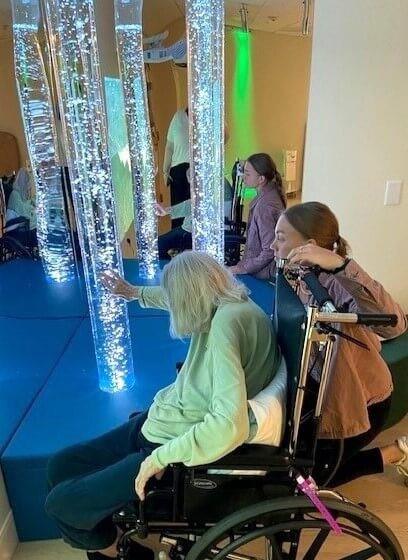
We also included fiber-optic lights, which use flexible, transparent fibers that transmit visually stimulating light signals that can promote visual and touch stimulation. That same person is interacting with those lights in the next photo!
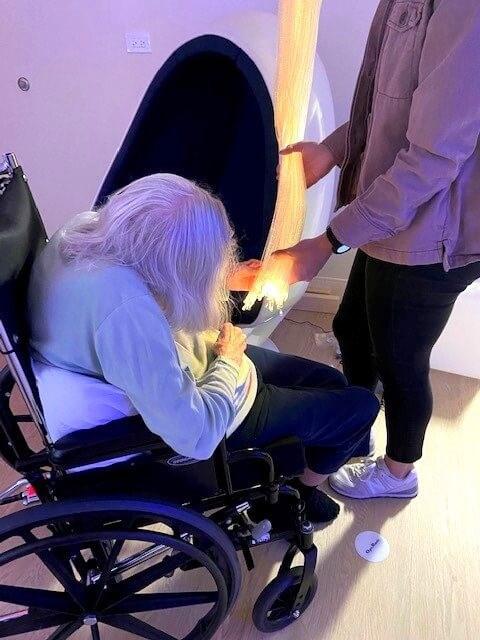
A room control system called Sensory Magic offers an incredible multi-sensory immersive experience. It allows us to choose lighting, color, sound, visual imagery, and themes specific to each patient's interests and needs. The result is a stimulating experience with a multitude of benefits, such as decreased anxiety and increased engagement.
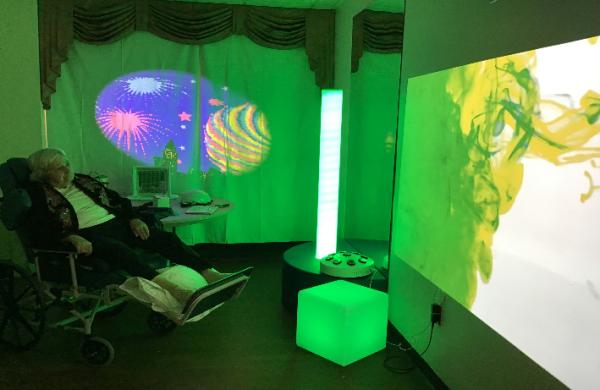
For people who are unable to come to the rooms due to mobility or other issues, we have a mobile cart called Sensory Rover that offers calming input and sensory stimulation to patients anywhere in our facility.
Our sensory rooms are improving patient well-being
Interventions that include sensory stimulation are especially beneficial to patients in long-term chronic care hospitals. Sensory rooms can offer many benefits for people living with dementia. These may include:
- Heightened awareness of surroundings
- Decreased agitation and wandering behavior
- Increased concentration
- Improved cognitive function
- Elevated mood and well-being
- Improved relationships with caregivers
- Enhanced quality of life
We have already seen these benefits at work! Here are just two stories of patients who have experienced positive changes in their mood and behavior:
Music and bubble tubes reduce anxiety and foster enthusiasm
In just a few sensory room sessions, one patient with dementia, seizures, and schizoaffective disorder experienced a noteworthy behavioral shift. Their treatment involved playing music from the speakers of our sound shell chair, a chair with an upholstered interior that envelopes the patient to cancel out exterior noise. This provides a calm environment to enjoy a relaxing experience.
This person enjoyed hearing music from their favorite artists, Joni Mitchell and Bob Dylan. The music relaxed and engaged them, reducing their tremors and agitation. The music also helped them recall long-term memories, prompted them to sing and sustain their focus, and reduced their verbal outbursts. Research has found that music is a promising intervention for patients with dementia and can increase communication in patients even when their verbal skills have diminished.
In our second session, I incorporated color-changing bubble tubes for visual and auditory stimulation, which fostered the same response. It was evident that they were enthusiastic to spend more time in the sensory room. Upon seeing me enter their room for our third session, they recognized me immediately and understood the purpose of my visit! They eagerly walked to the sensory room toward the sound shell chair, ready to listen to their preferred music, and continually requested specific songs.
Even more importantly, the patient verbally reported reduced anxiety, becoming more content and cooperative. This marked a positive shift from their usual flat affect and agitation. Ultimately, they appeared to benefit significantly from the combination of the auditory stimulation of the music, the tactile and auditory stimulation of the sound shell chair, and the visual stimulation of the bubble tubes.
Visual stimulation on a projector has a soothing effect
Another patient was transferred to our floor due to an increased risk of wandering. They had also become increasingly anxious and, at times, tearful.
By introducing this patient to the sensory room, we have successfully connected with them! When they sit in the room, they respond positively to images of animals on our Sensory Magic projector — their posture improves, and they become calmer and more attentive.
Hebrew Rehabilitation Center is at the forefront of memory care
Our sensory rooms are just one example of how our long-term chronic care team at Hebrew Rehabilitation Center helps patients with dementia feel supported, stimulated, and safe. At the Deanna and Sidney Wolk Center for Memory Health, Hebrew SeniorLife also offers comprehensive outpatient care for those at any stage of memory loss.
Hebrew Rehabilitation Center’s memory care centers deliver personalized care based on an understanding of each person’s life history and interests. This enables us to strengthen and prolong each patient’s physical and cognitive abilities as much as possible. Contact us online today or call us at 617-363-8372 to learn more.
Blog Topics
Learn More
Long-Term Chronic Care
Hebrew Rehabilitation Center provides person-centered extended medical care in a homelike setting for patients with chronic illness. As a licensed long-term chronic care hospital, we provide higher-level, more comprehensive medical care to older adults than a traditional nursing home.
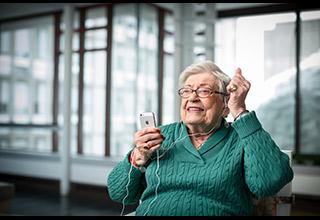
Memory Care
Our care team helps people with advanced Alzheimer's disease and other forms of dementia feel safe and stimulated, while maintaining a connection to community.



